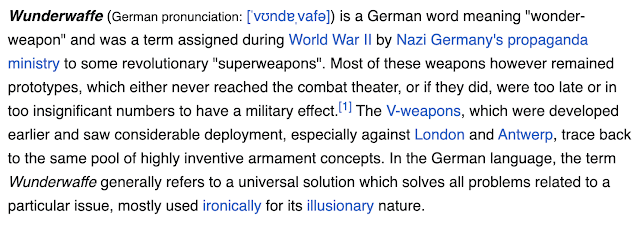When my older ad friends and I get together to talk, or kvetch, whichever comes second, it doesn't take long before someone bemoans the disappearance of the "agency of record" relationship.
In this era of GSP (Generalized Parsimonious Syndrome), no one wants to spend money on anything--least of all, continuity, the value of which is hard to measure. Further, like Hitler and dozens of psychotic leaders before and after him, as a "culture," we have bought into the idea of "Wunderwaffe," or "Wonder Weapons."
Wunderwaffe are an adjunct of societal mania. They're magical thinking--and a hypnotic delusion.
Back when I was in my early 20s, I knew a kid who wanted to be a novelist. He'd check his mailbox every day for a letter from a film studio, Henry Holt or Alfred Knopf. That letter never came. In part because this kid never finished his novel much less sent it out.
Wunderwaffe, in war, novels and advertising, embody the fantasy that something will come along, magically (or wondrously) and change everything in one swell foop.
Like trump's curing Covid with bleach, or light, or horse medicine. Or obese people thinking that eating grapefruit will make them look like Farrah Fawcett. Or the late 80s, American idee fixe about space lasers that could shoot down incoming ballistic missiles. Or NFTs, the metaverse, crypto-currency, or whoever will save the Mets this season. Or that data, or the use of the word 'agile' will save advertising.
(Speaking of panacea, I read something last week about a new nuclear-powered American aircraft carrier called the "Gerald Ford" which cost $13 billion to get up and cruising. The writer said, for that price you could have 650,000 $20,000 drones. Which would likely be way more devastating and able to destroy anything in their path.) Wonder Weapons or smarter reality?
But this is about advertising, remember. And agency-of-records.
Today, clients rarely buy and agencies even more unusually sell "Legos."
I don't mean the actual blocks.
This is a metaphor, remember.
The writing herein is fersisticated.
I mean a system of communications that can grow, contract, and shape into infinite configurations. That anyone can enjoy. That is endlessly adaptable and easy-to-use.
We don't sell Legos anymore. Even though Legos last forever and, like Sara Lee cakes, nobody doesn't like them.
Instead, we sell Wunderwaffe.
Wonder Weapons.
If you only do this's, everything will be solved. People will love your brand. New customers will flock to you. Your cash registers will reverberate. And your CMO will keep his job for 19 months, not 18.
So, we hire Beyonce for Verizon. A company that drops three calls in five and over-charges on five-out-of-five. A company universally hated.
Then we commission twenty million dollars of research study to prove the Beyonce spot worked. Do we ever ask people what they think? Do we ever imagine what would happen if there were a non-oligopoly choice? Do we ever calculate the cost of losing millions of customers/month to attrition and dissatisfaction?
Do we ever construct a Lego system of pieces that work together, that people love, that lasts forever that can address the disdain consumers have for the brand?
Or do we just do another commercial with another set of cruddy actors gushing cruddily over prices and services that no one actually sees or gets because no one actually sells it. And when that doesn't work, and it won't, we do it again with another set of cruddiness and hope for different results. Or commission the research to prove it's working.
What we've got here, above....and below.
A failure to communicate.
Because there's no patience or time to actually do things methodically, thoughtfully and foundationally.
Every ad I see looks like a car dealer ad or those horrible Cover Girl pre-roll commercials, where "near-models" open the spot by smiling into the camera and saying "this is a game-changer."
Naw.
The only thing that changes the game is changing the game. A different set of dice won't do it.
I don't know why I think of this now. But I do, so I'll end this way.
I've read in two different books over the last three months. One was by a former MI6 agent, one by a former CIA agent. They each wrote that the way to tell if you're being "surveilled" or followed by someone is to look at the suspected follower's shoes.
People tailing you will put on a fake mustache, a wig, dark-glasses, change their blue blazer to a black hoodie, and even walk with a limp. What they seldom do, I've read, is change their shoes.
Apparently, that takes too much work. Just ask your teenager who tracked in mud. Again.
So if it appears some different people are following you but they all have on brown tassel loafers, it's probably one person not half-a-dozen.
In short, change takes change from foot to head.
Not a Wunderwaffe.
A complete wardrobe.
Or to make a mnemonic couplet out of it.
There's no such thing as a panacea
For either you-a or me-a.




No comments:
Post a Comment